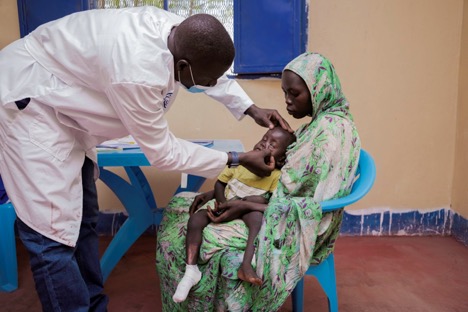By Liatile Putsoa, IOM South Sudan Media and Communications Officer
Malakal – Twenty-six-year-old Nyaluok Malith was out in the fields plucking wild leaves to cook when a neighbour’s child came running, shouting, ‘Mama, come home, come home. The baby has been hurt’.
Nyaluok says her heart sank immediately, even though it was not clear who the child was calling out to.
“God knows when I heard her call out ‘baby is hurt’, I wished with every bone in my body that she was not calling me,” says Nyaluok.
Dropping her bundle of leaves, she ran back to find her youngest child, two-year-old John Malut, in excruciating pain. His right leg had been badly burnt when a pot with boiling water tipped over.
“It was a sight that no mother should ever see,” says Nyaluok. “I felt hopeless.”
The last few months had been particularly hard for her and the family.

Twenty-six-year-old Nyaluok Malith and her son, John Malut. Photo: Liatile Putsoa/IOM
“I was not ready for another blow. We had just been forced to leave our home after our village was invaded by heavy flooding,” she says. “We came to stay with our relatives because our hut was under water.”
Nyaluok says they tried to treat her son’s burn at home because there was no health facility nearby, but infection set in after a few days. She and a relative then set off on a day’s journey on foot and by boat to Bam Primary Health Care Centre (PHCC), some four kilometres outside of Malakal town in South Sudan’s Upper Nile State.

Baby John is ready to go home after treatment at the Bam health care centre. Photo: Aleon Visuals/IOM
The International Organization for Migration (IOM) renovated the Bam clinic in October 2020. Before then, it was run down and did not open following the onset of conflict at the end of 2013. IOM’s Migration Health Unit (MHU) has trained the medical assistants, nurses and midwives who work in the clinic.
Today, the clinic serves more than 6,000 people from Bam village and surrounding areas.

IOM nurse Musa Musema treated the burn infection. Photo: Aleon Visuals/IOM
“I am very relieved that my baby is getting help,” says Nyaluok. “The doctor assured me that his leg will heal.”
Nyaluok added that she is happy her son is receiving the medical care for free because she “would not have money to pay”.
The Bam PHCC run by IOM’s Migration Health Unit (MHU) sees about 50 outpatients daily. IOM also provides free health services at the clinic in the Malakal Protection of Civilians (PoC) site and other parts of Upper Nile State. Through its static and mobile response teams, IOM directly provides life-saving preventative and curative primary health care, and routine immunization, to more than 800,000 people across South Sudan.
“Seeing patients who have sustained burns is not so common,” says Nurse Musa. “We see a lot of malaria and typhoid cases as well as cases of respiratory tract infection. We also provide maternal health care.”
After a few struggles from baby John, the leg was dressed. Nyalouk would have to bring him every day for redressing and a check-up until the leg heals.

Nurse Musa Musema advises Nyalouk on follow-up treatment for her son’s burn. Photo: Aleon Visuals/IOM
“We will stay with relatives in Malakal so that I can bring the baby to the clinic tomorrow,” says Nyalouk.
With that, Nyalouk and her son left the clinic, John skipping off in front of his mother, tears dried.
IOM’s Migration Health Unit activities are funded by the Foreign, Commonwealth and Development Office (FCDO); Gavi, the Vaccine Alliance; and USAID’s Bureau for Humanitarian Assistance (USAID/BHA).






